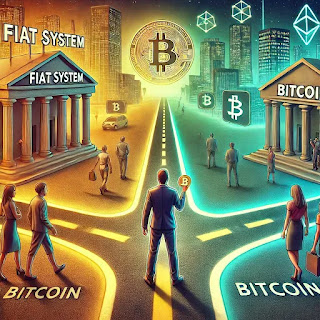Bitcoin as Humanity's Firewall
In the digital world, firewalls and antivirus software are our first lines of defense. They protect us from malicious code, prevent unauthorized access, and ensure that our systems remain stable and secure. Now imagine society itself as a kind of operating system, one that's constantly under attack from the viruses of corruption, inflation, censorship, and unchecked power. What if humanity had its own kind of antivirus? What if there was a way to firewall civilization from systemic failure? Enter Bitcoin.
For centuries, the malware of modern money has quietly infected our institutions. Central banks and fiat currencies function like rootkits, deeply embedded, invisible to the average user, and capable of altering the rules without permission. Inflation erodes savings, bailouts reward failure, and monetary policy is dictated by a handful of elites who face no consequences for corrupt decisions. It’s a system full of exploits, and most people don’t even realize their lives are being shaped by code they can’t see and didn’t write. This isn't just a bug; it's a feature, designed to serve those who control the money printer while the rest of us unknowingly operate on compromised hardware.
Bitcoin flips that entire paradigm on its head. It's open-source. It's transparent. It's verifiable by anyone. In a world where institutions have become black boxes of obfuscation and manipulation, Bitcoin is the clean code that anyone can audit. Its fixed supply and decentralized nature make it immune to the kind of manipulation that plagues fiat systems. Every transaction is broadcast to the world, and every node acts like a vigilant packet inspector, watching for fraud, verifying legitimacy, rejecting malicious inputs. The system doesn’t ask for your trust; it demands your verification.
Bitcoin doesn’t just defend against inflation or currency debasement. It protects against the broader societal rot that comes from centralized control. When a central authority has unchecked access to the monetary supply, it creates a moral hazard. Wars are waged on credit. Surveillance states are built without accountability. Crony capitalism flourishes. Bitcoin, by removing the ability to arbitrarily inflate and allocate capital, forces a return to economic reality, to a world where actions have consequences, and value must be earned, not conjured.
Proof of Work, often criticized for its energy use, is in fact Bitcoin’s immune system. It forces actors to expend real-world energy to earn trust in the system. This makes attacks expensive and trust earned, not assumed. Unlike fiat systems where influence is gained through connections and coercion, Bitcoin requires skin in the game. It doesn't matter who you are; it matters what you've proven. And by tying monetary creation to energy expenditure, it reconnects our abstract financial system to the physical world. It's an anchor to reality in a time when everything feels increasingly virtual and manipulated.
But Bitcoin's power doesn't stop at the technical level. It rewires how we think. It teaches responsibility, long-term thinking, and self-sovereignty. It invites us to verify rather than trust, to hold rather than gamble, and to build rather than beg. It is, in every sense, a kind of cultural antivirus. The more people run it, the harder it becomes for systemic corruption to take hold. It inspires a new ethos: one where individuals become nodes of resistance, armed with knowledge, empowered by truth, and insulated from the lies that centralized systems propagate.
The world we inhabit is unstable, manipulated, and riddled with legacy code that no longer serves us. But now, the patch is here. It doesn’t come from a government or corporation. It wasn’t designed to control us but to free us. Bitcoin is that patch. It's the firewall we didn’t know we needed, and now, more than ever, it's time to install it.
The future depends on what we choose to run: the corrupted operating system of the past, or the decentralized upgrade that protects our freedom. Tick tock, next block.




Comments
Post a Comment